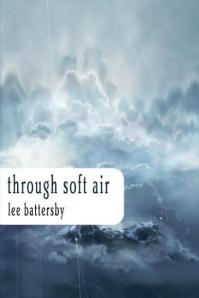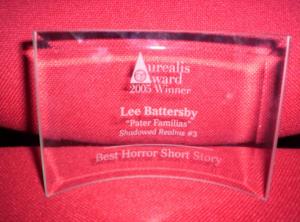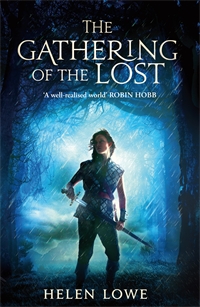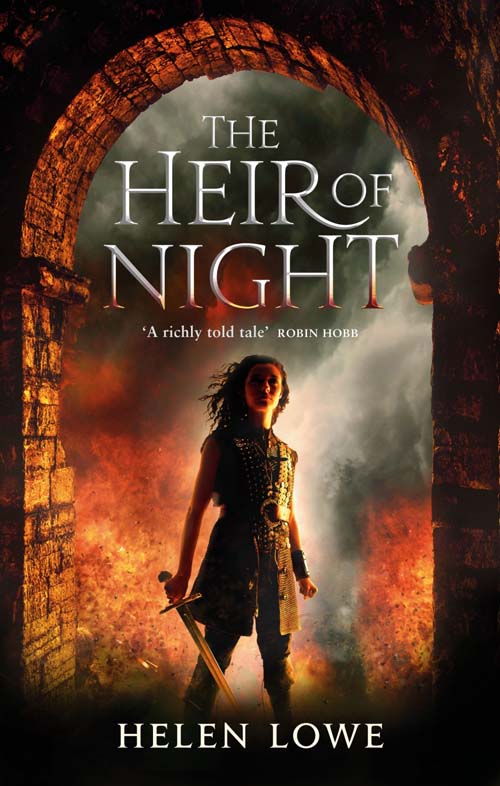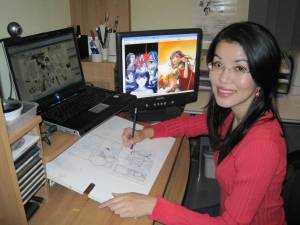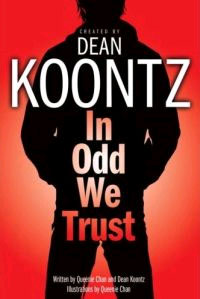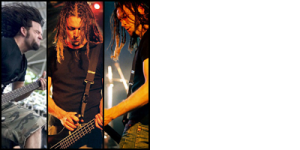I have been featuring fantastic female fantasy authors (see disclaimer) but this has morphed into interesting people in the speculative fiction world. Today I’ve invited the talented and amazingly busy female fantasy author Karen Brooks to drop by.
Watch out for the give-away question at the end of the interview.
 Q: Your first book published was It’s Time, Cassandra Klein, followed by The Gaze of the Gorgon, The Book of Night and Kurs of Atlantis . The first book came out in 2001 and the most recent in this series in 2004. You were dealing with quite adult themes and you aged your main character from 13 – 16 in the course of the books. Did you publishers have any reservations about the themes or the aging of your character?
Q: Your first book published was It’s Time, Cassandra Klein, followed by The Gaze of the Gorgon, The Book of Night and Kurs of Atlantis . The first book came out in 2001 and the most recent in this series in 2004. You were dealing with quite adult themes and you aged your main character from 13 – 16 in the course of the books. Did you publishers have any reservations about the themes or the aging of your character?
 My publishers, Lothian, were really very supportive about both the ageing of the characters (the other lead character, Simon, ages from almost 15-18) and the quite adult themes. Using Greek and Roman myths (and some from other cultures as well), it’s inevitable that you strike quite complex notions and characters (the gods themselves, many of whom feature in the books, as well as a variety of heroes, were feisty, flawed and while often narcissistic, also underwent their own trials and lessons which mirror those of my protagonists), never mind the fact that the series itself dealt with a range of issues such as loss, grief, the Holocaust, and mental illness, as well as the usual suspects such as sibling rivalry, loyalty, bravery, and self-discovery. Fortunately, the readership – which was both young adult and adult – didn’t have any reservations about the themes or ageing either!
My publishers, Lothian, were really very supportive about both the ageing of the characters (the other lead character, Simon, ages from almost 15-18) and the quite adult themes. Using Greek and Roman myths (and some from other cultures as well), it’s inevitable that you strike quite complex notions and characters (the gods themselves, many of whom feature in the books, as well as a variety of heroes, were feisty, flawed and while often narcissistic, also underwent their own trials and lessons which mirror those of my protagonists), never mind the fact that the series itself dealt with a range of issues such as loss, grief, the Holocaust, and mental illness, as well as the usual suspects such as sibling rivalry, loyalty, bravery, and self-discovery. Fortunately, the readership – which was both young adult and adult – didn’t have any reservations about the themes or ageing either!
Q: The main character of this series (Cassandra Klein) is thirteen when the first book opens. Did you choose to write at the upper end of primary/lower age end of YA for a specific reason? Also, these books are written under Karen R Brooks. Did you do this to differentiate your adult fiction (Do you write adult fiction?) and non-fiction books from children’s books and what does the R stand for? (Ruby, Rosemary, Regina?)
 I did write for the upper end – not only did I age Caz Klein from 13 to almost 16 across the four books, but many of the themes and the Greek and Roman myths I retold (through her adventures) were quite adult and confronting. I also dealt with themes of loss, mental illness and grief among many others, so it was appropriate to have an older YA protagonist and target the same demographic. The books seemed to fit comfortably in that age range and many adults read them too – which was lovely.
I did write for the upper end – not only did I age Caz Klein from 13 to almost 16 across the four books, but many of the themes and the Greek and Roman myths I retold (through her adventures) were quite adult and confronting. I also dealt with themes of loss, mental illness and grief among many others, so it was appropriate to have an older YA protagonist and target the same demographic. The books seemed to fit comfortably in that age range and many adults read them too – which was lovely.
The R in Karen R Brooks was to differentiate my adult writings from YA and also my academic work from fiction (though I now write adult fiction as Karen Brooks). It stands for Ruth and the name has a long history in my family. For as far back as we can trace ourselves (we are Mendelssohns from Germany), the eldest daughter was either called or given as her middle name, Ruth. My great-grandmother (who died in a Concentration camp) was Elsa Ruth Mendelssohn, my grandmother, Eva Ruth, mother Edna Ruth, then there’s me, and my daughter who is Caragh Louise Ruth. I used to not like Ruth – hence Caragh has two middle names, but now I love it – the history it evokes, the sense of a female line.
Q: I think we were at one of the Voices on the Coast festivals a few years ago when you were telling me about your plans for what became The Curse of the Bond Riders trilogy – a fantasy world that takes its inspiration from renaissance Venice full of magic, betrayal and mystery. Sounds fascinating. Now all three books are out, Tallow, Votive and Illumination. I understand you did a lot of research on Venice and lived in Europe for a while, travelling to Venice. (There are some lovely photos on Karen’s website which include photos from the European trip). Which comes first for you, the high concept then the research? Or does your general research on life prompt the high concept?
 Wow – great question! And I do remember telling you about the trilogy and you were so encouraging! Thank you!
Wow – great question! And I do remember telling you about the trilogy and you were so encouraging! Thank you!
The high concept came first – it always does now I come to think of it! In this instance, I had the idea for a candle-maker who basically produces these marvellous scented candles. The power of our olfactory senses are such (they are our oldest memories – our sense of smell), that when the scents infused into Tallow’s (my protagonist) candles are inhaled, people can be made to do all sorts of things – good and bad – be generous, fall in love, sign a contract, murder…. The idea for an assassin who uses candles and later becomes a celebrated courtesan was born and from that, the place and time became evident. Candles were an essential item in the Renaissance – any time pre-electricity really J – but when I started to read about Venice (I have always been mad on Italy, but didn’t know much about Venice), the novels simply had to be set there – for me, it was a natural fit. I set about learning everything I could. I wrote Tallow without ever having been to Italy let alone Venice. But before Votive (the second book) was finished, I’d been to Venice twice (I had the privilege of living and teaching in The Netherlands for a few months, so was able to “duck” over! The beauty of Europe from the perspective of an Australian – the proximity of countries and thus different cultures and cuisines to each other!), I also studied the Italian language for two years.
Q: You have a doctorate in Humanities specialising in Social Media. You lecture at UNI in ‘… the areas of media, youth, sexuality and popular culture using a psychoanalytical model’, and travelled to Beijing (China) as the first Australian Writer in Residence at the Western Academy in 2005. In 2007 and again in 2009 you spent six weeks at Teiko University (Netherlands) where you taught. You are called on as an expert to comment on Channel 7’s Sunrise and Today/tonight. (For a list of some of Karen’s articles see here). You’ve appeared on 60 minutes and on The Einstein Factor as part of the ‘Brains Trust’. With all this study and commentary are you tempted to write near future SF? We are currently living in ‘interesting times’ as the Chinese curse goes. Where can you see Australian/first world society going in the next ten years?
 I am tempted to write sci-fi! LOL! In fact, a novel I started many years ago now (but never finished – maybe one day…) was called The Cairn Experiment and was set about three-four hundred years in the future where society has reverted to very Victorian ideals about gender and sex roles especially. Women are again oppressed and while they can operate in public space and be employed, it is always in subservient roles, as assistants etc. Men too are imprisoned by the expectations of their sex. The story follows one female who’s the assistant of a rather prudish, brutish scientist and his team, sent to a place that they only recently discovered on an old map, which is called “Cairn Island” (the “Pitt” part has been erased through age). What they find on this unchartered island is set to tear society apart.
I am tempted to write sci-fi! LOL! In fact, a novel I started many years ago now (but never finished – maybe one day…) was called The Cairn Experiment and was set about three-four hundred years in the future where society has reverted to very Victorian ideals about gender and sex roles especially. Women are again oppressed and while they can operate in public space and be employed, it is always in subservient roles, as assistants etc. Men too are imprisoned by the expectations of their sex. The story follows one female who’s the assistant of a rather prudish, brutish scientist and his team, sent to a place that they only recently discovered on an old map, which is called “Cairn Island” (the “Pitt” part has been erased through age). What they find on this unchartered island is set to tear society apart.
Maybe, one-day, I’ll return to it. But I think what I am describing in that novel summarises my fears… that somehow, while we’re advancing in so many wonderful ways – science, technology, medicine – in terms of sex, gender and even the arts, there is a sense of marking time or, worse, retreating, as if we’re afraid of what we’re capable of as men, women, children. The apparent rise of a very vocal and conservative right is indicative of this and the power they have to sway political decisions and policy is alarming – and not just in first world countries either. There is also a reversion to a preference for clichéd behaviour and thoughts over originality; stereotypes masquerading as individuality and the rise of the “it’s all about me” phenomena, whether it be the narcissist unable to hold down a relationship, girls insisting on being treated like princesses and boys silly enough to attempt to do that, worrying about what “I” can get out of something instead of working towards a mutual goal… the preparedness to pepper conversations with personal pronouns…. I also worry about the notion that “fame” in and of itself (without accompanying hard work or experience) has become a desirable destination for some people, regardless of the cost; the need to be noticed. I despair that feminism is the new “f” word, that young men and women are viewed by corporations and others as consumers more than they are people and… I better stop Jsounds so pessimistic! But, I also have great hope for the future as well. We are, despite reports to the contrary and even my above observations, kinder towards each other than in the past, crime has dropped, we are able to travel and thus broaden our minds, and we’re able to debate ideas and concepts freely – at least here in Australia…. We are also critical consumers of everything, really. I just wish we’d do more of all of that. I wish we’d tolerate or at least respect difference and not be so fearful of it (I am thinking very much of gay marriage and refugees, but there are so many other issues at stake with people at the heart – I think we forget that, our humanity sometimes). Also, young people are more engaged with the world, each other and socially conscious – aware of social justice – than any generation previously. I meet some utterly fabulous young people and older ones too and, though I can despair, these people collectively give me great hope for the future.
 Q: In your book Consuming Innocence you cover ‘… the complex relationship parents, teachers and children have with popular culture – that is, advertising, sexiness, TV, computers, films, mobile phones and fashion.’ This was published in 2008 so I’m assuming it was written in 2006- 2007. Twitter didn’t exist then and not everyone was blogging, madly revealing their private fears and foibles to the world. Have you been approached to update the book for a new edition?
Q: In your book Consuming Innocence you cover ‘… the complex relationship parents, teachers and children have with popular culture – that is, advertising, sexiness, TV, computers, films, mobile phones and fashion.’ This was published in 2008 so I’m assuming it was written in 2006- 2007. Twitter didn’t exist then and not everyone was blogging, madly revealing their private fears and foibles to the world. Have you been approached to update the book for a new edition?
Simple answer – no. Everything in the book except the technology chapter (which was out of date the moment it was written for all the astute reasons you point out above) is still relevant today. Saying that, I could easily update it and include new research. I try to stay on top of things but there is so much out there. I worry it becomes like white noise. That’s why it is important to filter and distil it down to its significant essence, which is what my book tries to do.
Q: I found out Sara Douglass was ill about three weeks before she died, when I approached her for an interview for this blog. Unfortunately, the interview was more than she could manage and I was very sorry to have missed the opportunity. Sara and I had met several times over the last ten years. But you were a close friend and wrote a lovely piece, ‘Sara Douglass Remembered’ on the Voyager blog, and you gave Sara’s acceptance speech for the Norma K Hemming Award. Recently, my husband and I were trying to trace an old friend and finally ran him down via the web only to discover he’d died a couple of years ago of aids. Because of the web, people have a web-ghost who lives on after them in profiles, interviews etc, where friends and those who have just discovered their work (if they are creatives) can go and discuss their books and their lives. Have you written about the roll-on effects of web-ghosts in your field of Media Studies?
No. But I should. Before Sara died, I thought it a bit macabre to upload messages to a dead person’s site – especially from those who don’t know the person. It happens often when there’s a tragedy – a young person dying, a soldier in Afghanistan – so many people feel compelled to write something or give flowers or express their grief for someone who’s ostensibly a stranger. I understood their family and friends needing to reach out, express themselves, their pain, but not those who bore no relationship to them. I have subsequently, since Sara died, changed my mind. I have found her FaceBook page oddly reassuring, a comfort – it’s a “living” cyber-memorial even though she has died – not just for myself, but for all those whose lives she touched in some way. I have administrative control over Sara’s FaceBook page (something she granted me while still alive). When she died, I first wanted nothing to do with it (it was too painful). I posted news of her death and some updates, but had to walk away. But now, I find great comfort and delight, not only in reading posts from her fans and friends as they interact about her, her books and the joy her stories have brought and still bring, but relish her lingering presence as well. I wonder if others who have lost someone close feel the same way? But yes, by trawling through the old updates and interviews etc you do manage to get a strong sense of the person and they live on in digital form. Now I am grateful for that.
I love the idea of web-ghosts, Rowena! Thank you. And I will definitely write about it.
 Q: Following on from that, I’m fascinated by creativity, where it comes from, the function it serves society. In an article on New Scientist I read that people who considered themselves creative, whether they were sewing, gardening or writing/composing/painting, the same areas of their brains light up when doing these activities. As someone who is both creative and an academic, what is your take on creativity?
Q: Following on from that, I’m fascinated by creativity, where it comes from, the function it serves society. In an article on New Scientist I read that people who considered themselves creative, whether they were sewing, gardening or writing/composing/painting, the same areas of their brains light up when doing these activities. As someone who is both creative and an academic, what is your take on creativity?
I find that creativity can take all forms. For me, being academic – whether it’s researching an article or paper for a conference or for publication in a journal is creative as well. So often, “creative” is simply regarded as something that can only happen within the broad realm of the “arts” – with fiction writers, artists, musicians, gardeners etc. yet, creativity is much broader than that and makes an enormous contribution to society. Architects, scientists, historians, technologians, mathematicians, they’re all equally creative. If they weren’t, we wouldn’t have half the amazing inventions and ideas that we do – Steve Jobs, Bill Gates, just like Steven Spielberg, Dr Ian Fraser, or JK Rowling, are incredibly creative and innovative.
I do approach writing fiction and non-fiction differently in that I labour over the language more with fiction, with making sure the words are just right (the options are much greater). With academic jargon, academic writing, because you are contributing to knowledge culture and joining an ongoing dialogue with ideas that can be tested and often proven, you have to be precise, so it limits your choices, and it doesn’t do you any favours to be ambiguous whereas in fiction, you can be playful and work double and more meanings into your prose.
Q: In your 2012 Snapshot Interview you say ‘… I am working on two adult novels: one a contemporary and historical fantasy (it shifts time and place) that involves witchcraft, but not as we think we know it (and yes, it is thoroughly researched ☺) and, another historical fiction with not so much fantasy, but more magic realism and then only a little, that’s set in England and Flanders in the 1400s.’ These sound like fascinating projects. When can we hope to see them?
 Ahhhh… I don’t know, Rowena. I have shelved the witchcraft one for the moment and am working on the other and loving it. I am only a short way into it and am not going to rush it, but I do hope to have it finished by the end of the year. Will it see the publishing light of day? I certainly hope so.
Ahhhh… I don’t know, Rowena. I have shelved the witchcraft one for the moment and am working on the other and loving it. I am only a short way into it and am not going to rush it, but I do hope to have it finished by the end of the year. Will it see the publishing light of day? I certainly hope so.
Q: I was prompted to start this series of interviews because there seems to be a perception in the US and the UK that fantasy is a bit of a boy’s club. Do you think there’s a difference in the way males and females write fantasy?
Wow – what a powerful and potentially divisive question – this could get me into trouble! I was discussing this with another writer the other day in regards to George R R Martin. She felt that he was very masculine in his style and that it was distinctive from, say, yours, mine or hers or someone like Anne McCaffrey’s. Certainly, Martin is attracting a great deal of attention with the magnificent HBO TV series based on his series, and I do love his written work – a big fan – but is his style different because he’s a man? Maybe? Does it make it better? Worse? Neither – that’s nothing to do with sex, but about the quality of the writing and story. If there is a difference between the way men and women write (and I would suggest there has to be at least a small one – eg. a woman writer can get in a woman’s head better and vice-a-versa – not that we can’t get inside the mind of the opposite sex, it’s just the same sex can do it more accurately more often.  This might lead to male writers featuring main characters that are men and women writers, females more often, but, of course, the opposite happens and very well too), then it might be to do with point of view – the predominant one. But I don’t think the differences are as big as some might like to find. I am re-reading Sara Douglass at the moment and I feel she writes in a very direct, assertive way that drags you straight into the action and shocks you but also has such emotional depth. Like Martin, she doesn’t hesitate to sacrifice character for the sake of the story but he also manages to manipulate your emotions and make you care deeply. I have read other female and male fantasy writers who, from my perspective, do the same thing. They do the most wonderful job of crafting character and place – their work simply oozes personality and verisimilitude and you long to lose yourself in that space over and over. Juliet Marilliier, Jacqueline Carey, Kim Wilkins, Cory Daniells, JK Rowling, and many more, have this uncanny knack of creating simply wonderful worlds that leave you breathless and pluck at your emotions but they can also do epic or dark, or brutal too. But then, I have found the same with some male writers – examples off the top of my head are Hugh Howey, CS Lewis, Terry Brooks, Ian Irvine, Richard Harland, Antony Eaton, (no relation) and so many more.
This might lead to male writers featuring main characters that are men and women writers, females more often, but, of course, the opposite happens and very well too), then it might be to do with point of view – the predominant one. But I don’t think the differences are as big as some might like to find. I am re-reading Sara Douglass at the moment and I feel she writes in a very direct, assertive way that drags you straight into the action and shocks you but also has such emotional depth. Like Martin, she doesn’t hesitate to sacrifice character for the sake of the story but he also manages to manipulate your emotions and make you care deeply. I have read other female and male fantasy writers who, from my perspective, do the same thing. They do the most wonderful job of crafting character and place – their work simply oozes personality and verisimilitude and you long to lose yourself in that space over and over. Juliet Marilliier, Jacqueline Carey, Kim Wilkins, Cory Daniells, JK Rowling, and many more, have this uncanny knack of creating simply wonderful worlds that leave you breathless and pluck at your emotions but they can also do epic or dark, or brutal too. But then, I have found the same with some male writers – examples off the top of my head are Hugh Howey, CS Lewis, Terry Brooks, Ian Irvine, Richard Harland, Antony Eaton, (no relation) and so many more.
I do think male fantasy writers get more of a particular kind of attention (despite the incredible success of Rowling and Stephanie Meyer and others), so that folk tend to sit up and take more notice of them and that gives the impression of and contributes to the “boy’s club” notion. But, stylistically, I think if you took names off covers and gave a reader a few different authors’ works to read, it would be hard to tell the sex. Again, there are exceptions – some authors have a distinctive style, which is little do with their sex as writers – Stephen King for example, you can pick his work, likewise, Robin Hobb.
So, I guess my simple answer NOT, is yes and no!!!
 Q: Following on from that, does the gender of the writer change your expectations when you pick up their book?
Q: Following on from that, does the gender of the writer change your expectations when you pick up their book?
No. Not at all.
Q: And here’s the fun question. If you could book a trip on a time machine, where and when would you go, and why?
OK… I always thought I wanted to go back – you know, to ancient Greece, or Rome or Elizabethan England… but no. I want to travel into the future – at least two hundred years from now. Australia will do. I want to see if we learn the lessons of today tomorrow – I want to see what state the environment’s in, what’s our attitude to people from other cultures, is gay marriage just taken for granted in that time? Has the word “gay” disappeared from our vocabulary and we are all just humans with a sexuality? I would love to talk to people and see if their hopes and dreams are like ours now. I want to know what they think of us – how they reflect on the history we’re creating today. Do they think we’re an embarrassing blip on the history radar with our love of celebrities, Reality TV, our need to consume, or are they proud of our legacy in other ways? That we instigated changes to the way we respect the environment, that we were concerned about tolerance and acceptance, about health and ageing? How are children treated in the future? Old people? Refugees? Do they even exist? I also want to see who and what they worship (secular?) and if they’re still showing reruns of The Simpsons on what passes for TV.
Give-away Question:
If you could travel anywhere in time or space, where would you want to go, who would you most want to meet and why?
Follow Karen on Twitter: @Asprob
See Karen’s blog
Catch up with Karen on LinkedIn
Catch up with Karen on GoodReads
Catch up with Karen on Facebook




